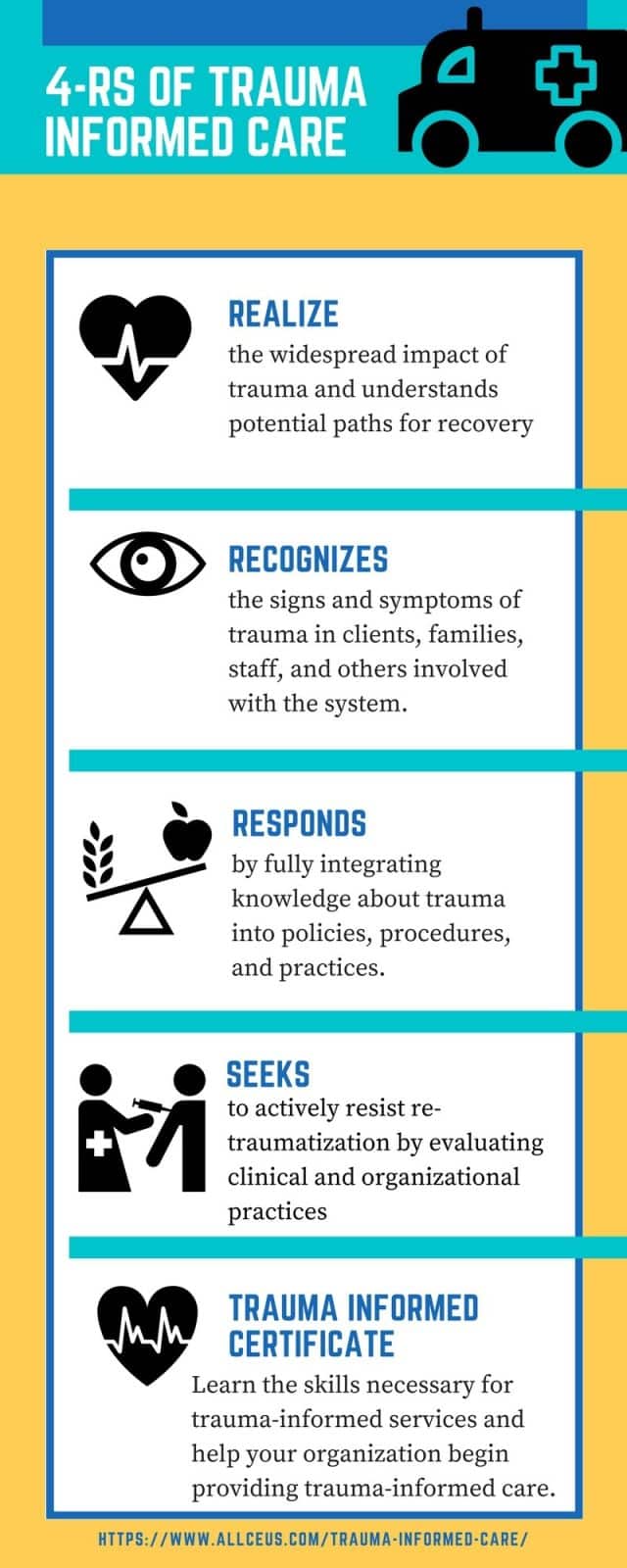
Trauma Informed Care Certification Training
The leading online provider of AFFORDABLE online, self-paced counselor certification training to help you enhance your new career!
- We have students in 48 countries
- Courses in multiple formats (video, text, live webinar and podcast) to meet your learning preferences
- Instructors available 7 days a week via email to answer your questions and help you apply the material.
Trauma Informed Care Counseling Online Certification

Trauma-specific interventions are used within a trauma-informed system of care and generally recognize the following:
- The survivor’s need to be respected, informed, connected, and hopeful regarding their own recovery
- The interrelation between trauma and symptoms of trauma such as substance abuse, eating disorders, depression, and anxiety
- The need to work in a collaborative way with survivors, family and friends of the survivor, and other human services agencies in a manner that will empower survivors and consumers
Become a lead trauma expert at your facility, and assist them in developing a trauma-informed environment. Many agencies are recognizing the importance of using a trauma informed approach, yet do not know where to begin to assess their current system, make necessary changes and provide training to staff. Sign up $149.
The 4 Rs of the Trauma-Informed approach:
- Realizes the widespread impact of trauma and understands potential paths for recovery;
- Recognizes the signs and symptoms of trauma in clients, families, staff, and others involved with the system;
- Responds by fully integrating knowledge about trauma into policies, procedures, and practices; and
- Seeks to actively resist re-traumatization.”
Six key principles of a Trauma-Informed Approach:
- Safety
- Trustworthiness and Transparency
- Peer support
- Collaboration and mutuality
- Empowerment, voice and choice
- Cultural, Historical, and Gender Issues
This certificate will provide the clinician with:
- Trauma 101–Provides an overview of trauma, and an understanding of trauma informed principles and practices
- Trauma-Informed Care: Increases awareness of the different types of trauma, their impact and individual differences in the experience of traumatic events.
- Trauma Informed Care: Impact of Trauma: Overview of the effects of trauma on the brain and physical health; social relationships; mental health; and the community/society at large.
- Trauma Informed Care: Screening and Assessment
- Trauma Informed Care: Trauma Specific Services reviews many of the current best and promising practices for survivors of trauma, ranging from child abuse to natural disasters.
- Trauma and Resiliency: Highlights the concepts and components of individual, family and community resiliency.
- Neurological Impact of Trauma: Provides an overview of the human brain and its response to stress and trauma.
- Pharmacotherapy for Trauma: Reviews current practice guidelines for the use of SSRIs, Benzodiazepines, Rapid-Acting Antidepressants, Alpha-1 Antagonists and Mood Stabilizers
- Acute Stress Disorder: Assessment and Treatment
- Acceptance and Commitment Therapy for Trauma
- Cognitive Processing Therapy for Trauma
- Intro to Dialectical Behavior Therapy for Trauma
By the end of the training, the clinician will:
- Understand the difference between trauma-informed and trauma-specific services
- Understand the differences among various kinds of abuse and trauma, including: physical, emotional, and sexual abuse; domestic violence; experiences of war for both combat veterans and survivors of war; natural disasters; and community violence
- Understand the different effects that various kinds of trauma have on human development and the development of psychological and substance use issues
- Understand how protective factors, such as strong emotional connections to safe and nonjudgmental people and individual resilience, can prevent and ameliorate the negative impact trauma has on both human development and the development of psychological and substance use issues
- Understand the importance of ensuring the physical and emotional safety of clients
- Understand the importance of not engaging in behaviors, such as confrontation of substance use or other seemingly unhealthy client behaviors, that might activate trauma symptoms or acute stress reactions
- Demonstrate knowledge of how trauma affects diverse people throughout their lifespans and with different mental health problems, cognitive and physical disabilities, and substance use issues
- Demonstrate knowledge of the impact of trauma on diverse cultures with regard to the meanings various cultures attach to trauma and the attitudes they have regarding behavioral health treatment
- Demonstrate knowledge of the variety of ways clients express stress reactions both behaviorally (e.g., avoidance, aggression, passivity) and psychologically/emotionally (e.g., hyperarousal, avoidance, intrusive memories)
- Expedite client-directed choice and demonstrates a willingness to work within a mutually empowering (as opposed to a hierarchical) power structure in the therapeutic relationship
- Maintain clarity of roles and boundaries in the therapeutic relationship
- Demonstrate competence in screening and assessment of trauma history (within the bounds of his or her licensing and scope of practice), including knowledge of and practice with specific screening tools
- Show competence in screening and assessment of substance use disorders (within the bounds of his or her licensing and scope of practice), including knowledge of and practice with specific screening tools
- Demonstrate an ability to identify clients’ strengths, coping resources, and resilience
- Facilitate collaborative treatment and recovery planning with an emphasis on personal choice and a focus on clients’ goals and knowledge of what has previously worked for them
- Respect clients’ ways of managing stress reactions while supporting and facilitating taking risks to acquire different coping skills that are consistent with clients’ values and preferred identity and way of being in the world
- Demonstrate knowledge and skill in general trauma-informed counseling strategies, including, but not limited to, grounding techniques that manage dissociative experiences, cognitive- behavioral tools that focus on both anxiety reduction and distress tolerance, and stress management and relaxation tools that reduce hyperarousal
